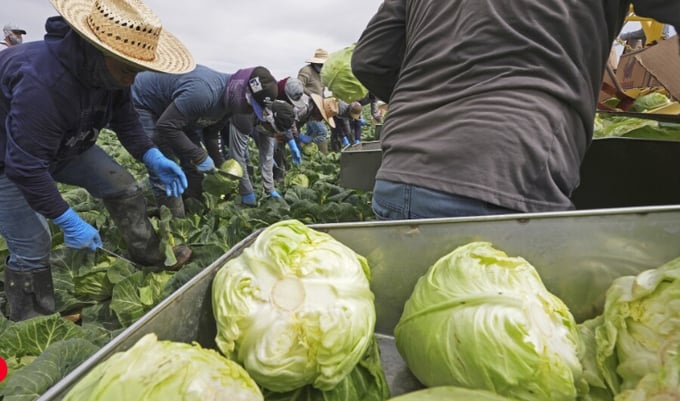November 26, 2025 | 14:43 GMT +7
November 26, 2025 | 14:43 GMT +7
Hotline: 0913.378.918
November 26, 2025 | 14:43 GMT +7
Hotline: 0913.378.918

Farmers across the U.S. can expect the new tariffs on Mexico, Canada and China and the retaliatory action from those countries to hurt their bottom lines by billions of dollars if they stay in place, while consumers could quickly see higher prices for agricultural products and ground beef.
Farmers and meat producers across the U.S. can expect the new tariffs on Mexico, Canada and China and the retaliatory action from those countries to hurt their bottom lines by billions of dollars if they stay in place a while, and consumers could quickly see higher prices for produce and ground beef.
But some of the impact on farmers might not be felt until the next harvest and some products might actually get cheaper in the short run for consumers if exports suffer. And the price of corn, wheat and soybeans accounts for relatively little of the price of most products. Plus, President Donald Trump could offer farmers significant aid payments, as he did during the trade war with China during his first administration, to offset some of the losses.
In his address to Congress Tuesday night, Trump argued that agricultural imports hurt American farmers and asked them to “bear with me again” as he seeks to protect them. He didn’t mention any additional aid.
“I love the farmer,” he said.
If the tariffs make farmers uneasy about investing in expensive tractors and consumers worry so much about groceries that they cut other spending, that would hurt the economy overall and could even lead to a recession. And consumers were already worried about record egg prices amid a bird flu outbreak.
“Exactly how strong our economy is over time has a lot to do with U.S. consumers’ comfort with continuing to go out to restaurants and continuing to buy washers and dryers and just that general activity. And a lot of what we’re talking about here is probably going to slow some of that,” said Glynn Tonsor, an agricultural economist at Kansas State University.
The situation has some farmers stocking up on equipment and supplies in preparation for prices to go up, but it’s not like they can easily buy all their fertilizer ahead of time. And consumers might have a hard time stockpiling perishable products like avocados and ground beef.
The details of how the tariffs are implemented and whether any products are excluded will also matter.
(AP)

(VAN) A new study reveals how the simultaneous effects of ocean acidification, salinity and loss of oxygen are making the world more fragile.

(VAN) Hopes are growing that the creation of the first 3D turkey gut model could be a turning point in the battle against the virulent blackhead disease.

(VAN) Tyson, America’s biggest meat supplier, plans to shutter one of its largest beef processing plants as the industry continues to struggle with low cattle supplies and political pressure from Washington.

(VAN) New FAO study shows how digital solutions are empowering farmers and fishers to prevent losses and build resilient agrifood systems.

(VAN) Brazil's COP30 presidency pushed through a compromise climate deal on Saturday that would boost finance for poor nations coping with global warming but that omitted any mention of the fossil fuels driving it.

(VAN) Poultry farmers in the UK have been warned that they could face one of the worst winters yet for bird flu.

(VAN) Prices of main-crop paddy have risen sharply, with jasmine rice hitting 16,100 baht per tonne — the highest level in years.